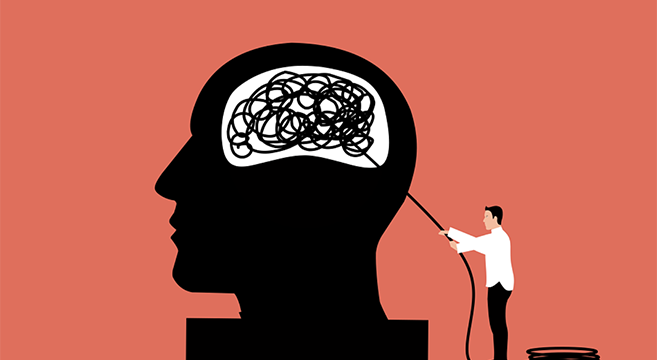If you are one of the millions of people who suffer from OCD, you know how difficult it can be to manage your condition. The intrusive thoughts and compulsive behaviors can take over your life, making it hard to do anything else. There is good news, though: there is a therapy that has been shown to be very effective in treating OCD. This therapy is called EMDR (Eye Movement Desensitization and Reprocessing). In this blog post, we will discuss what it is and how EMDR helps in OCD!
Contents
What Is EMDR (Eye Movement Desensitization and Reprocessing)?
 EMDR refers to a form of psychotherapy that helps in treating mental disorders. It is a therapy that uses eye movement in order to help patients process and heal from their traumas. EMDR was originally developed to treat post-traumatic stress disorder (PTSD). However, it has also been found to be effective in treating OCD.
EMDR refers to a form of psychotherapy that helps in treating mental disorders. It is a therapy that uses eye movement in order to help patients process and heal from their traumas. EMDR was originally developed to treat post-traumatic stress disorder (PTSD). However, it has also been found to be effective in treating OCD.
Because it helps in reducing the intensity of OCD symptoms. It also helps in increasing the patient’s ability to cope with their obsessive thoughts and compulsive behaviors. EMDR is usually done in a series of sessions, with each session lasting for about an hour.
This type of therapy is basically based upon the idea of “desensitization.” This is because eye movements help in reducing the emotional intensity of the memories that are being processed. This, in turn, helps the patients to better deal with their obsessions and compulsions.
Moreover, studies have shown that EMDR for OCD is more effective when it is combined with other forms of treatment such as CBT and ERP. So you should look around if you want to find a therapist who offers this type of therapy.
How Does EMDR For OCD Work?
EMDR for OCD is a type of therapy that helps to reprocess and heal past traumas that may be causing symptoms of OCD. EMDR is short for eye movement desensitization and reprocessing. This therapy can help to lessen the symptoms of OCD by helping to release any negative emotions or memories that may be associated with the trauma.
EMDR is conducted by a therapist who will guide the patient through a series of eye movements, while the patient focuses on a specific memory or event. The therapist will also help the patient to process any negative emotions that may be associated with the memory.
For example, it is not uncommon for people with OCD to have a fear of contamination.
This may be due to a past event such as witnessing someone being ill or being in a place where there was a high risk of contamination such as a hospital. So a therapist will help the patient to focus on the memory of the event while making eye movements. The therapist will also help the patient to process any negative emotions associated with the memory such as fear, anxiety, or disgust.
According to studies, this treatment option is highly effective in treating OCD. In one study, it was found that 84% of patients who underwent EMDR for OCD no longer met the criteria for OCD after just 12 sessions. It is also worth noting that EMDR is a short-term treatment option, with most patients only requiring around 12 sessions.
If you are struggling with OCD, then EMDR for OCD may be a treatment option worth considering. This therapy has been shown to be highly effective in treating OCD and can provide long-lasting relief from symptoms.
What Other Conditions Can EMDR Help With?
 There are a number of other conditions that EMDR can help with, including:
There are a number of other conditions that EMDR can help with, including:
- PTSD: It is estimated that 70% of people who experience a traumatic event will go on to develop PTSD. EMDR can help by reducing the intensity of the trauma and its associated symptoms.
- Anxiety disorders: This is one of the most common conditions that EMDR can help with. It can be used to treat both generalized anxiety and specific phobias.
- Depression: EMDR has been found to be especially effective in treating depression that is linked to a traumatic event.
- Eating disorders: This type of therapy can help people who are struggling with anorexia, bulimia, and binge eating disorders.
- Substance abuse: EMDR can be used as part of a treatment plan for people who are struggling with addiction.
As you can see, EMDR is a versatile therapy that can be used to help people with a wide variety of mental health conditions. If you think it could help you, talk to your doctor or therapist about whether it might be right for you.
However, it is important to discuss any potential risks with your doctor or therapist before beginning treatment. While EMDR is generally considered to be a safe therapy, there is a small risk that it could make symptoms worse. Therefore, it is important to work with a qualified professional who can help you through the process.
If you are struggling with OCD, EMDR may be a treatment option worth considering. Talk to your doctor or therapist to see if it could be right for you.
What Are The Benefits Of EMDR?
 When the treatment option is presented to patients, many wonder what are the benefits of EMDR. How can something that seems so simple help with a complex mental illness like OCD? The truth is, for many people struggling with this condition, EMDR can be life-changing.
When the treatment option is presented to patients, many wonder what are the benefits of EMDR. How can something that seems so simple help with a complex mental illness like OCD? The truth is, for many people struggling with this condition, EMDR can be life-changing.
EMDR has been shown to be an effective treatment for OCD in numerous studies. In fact, a meta-analysis of 22 studies found that EMDR was more effective than exposure and response prevention (ERP), the gold standard treatment for OCD. Let’s discuss some of the common benefits of the therapy. These include:
Decreases the intensity and frequency of symptoms
This is one of the common benefits of EMDR for OCD patients. The therapy helps to lessen the symptoms that are experienced by patients. This, in turn, leads to a decrease in the frequency and intensity of obsessions and compulsions. Because it is very common for people with OCD to have severe anxiety, the decrease in symptoms can also lead to a reduction in anxiety levels.
Increases self-esteem and confidence
Another common benefit of EMDR for OCD patients is that it helps to increase their self-esteem and confidence. Many people with OCD have low self-esteem because of their condition. They may feel like they are not good enough or that they are not worthy of love and attention. EMDR can help to change these negative beliefs and increase self-esteem.
Increases sense of control
Many people with OCD feel like they have no control over their thoughts and behaviors. This can be extremely frustrating and can lead to a feeling of hopelessness. EMDR can help to increase a sense of control by teaching patients how to manage their thoughts and behaviors. This can be a very empowering feeling for people with OCD.
Improves insight and understanding of OCD
It is very common for people to have a very limited understanding of their OCD. This can lead to a lot of confusion and frustration. EMDR can help to improve insight and understanding by providing patients with information about their condition. This can be extremely helpful in managing OCD. Because when you are aware of your triggers, you can be better prepared to manage them.
Better coping skills
OCD can be a very difficult condition to deal with. It can be very helpful to have coping skills to help manage the symptoms. EMDR can help to improve coping skills by teaching patients how to deal with their thoughts and behaviors. This can be extremely helpful in managing OCD. For example, if you know how to deal with your obsessions, you will be less likely to engage in compulsive behaviors.
Hence, there are overall numerous benefits that a person can experience by undergoing EMDR treatment for OCD. If you or a loved one is struggling with OCD, please consult a mental health professional to see if this therapy may be right for you.
Are There Any Risks?
 When something has the potential to be helpful for treating a condition as serious as OCD, it is important to also consider any risks involved. Thankfully, EMDR appears to be a relatively low-risk therapy. A 2012 study found that adverse effects from EMDR were “mild, transitory, and infrequent” when compared to other types of therapy (like exposure and response prevention).
When something has the potential to be helpful for treating a condition as serious as OCD, it is important to also consider any risks involved. Thankfully, EMDR appears to be a relatively low-risk therapy. A 2012 study found that adverse effects from EMDR were “mild, transitory, and infrequent” when compared to other types of therapy (like exposure and response prevention).
As with any therapy, there is always a potential for things to go wrong. In the hands of a trained and experienced professional, however, EMDR appears to be a safe and effective treatment for OCD. However, some potential risks might include:
- Feeling worse after EMDR sessions
- Having difficulty processing emotions
- Feeling overwhelmed by emotions during or after EMDR
- Experiencing flashbacks of traumatic events
If you are considering EMDR for OCD, be sure to speak with a mental health professional about any potential risks and whether this therapy might be right for you. Thus, if you have tried EMDR and found it to be ineffective or even harmful, there are other options available. Don’t give up hope – the right treatment for you is out there.
Conclusion
To conclude, EMDR for OCD is considered to be an effective treatment option that can help patients in reducing their symptoms and improving their quality of life. The therapy has been found to be helpful in treating other mental disorders as well, such as post-traumatic stress disorder (PTSD).
It is often believed that EMDR is only for people who have experienced trauma, but this is not the case. EMDR can be used to help people who suffer from anxiety, depression, and other mental disorders. If you or someone you know is struggling with OCD, consider talking to a therapist about whether EMDR could be right for them.
You can also consider reaching out to Therapy Mantra for more information and resources on OCD and other mental disorders. Our team of experts can help you find the right treatment option for you or your loved one. Contact us today to learn more. You can also book an online therapy or download our free OCD treatment app on Android or iOS.


